If you’re hoping to take your gains to the next level you may already know that the best pre-workout supplements can provide a reliable kick in the pants. Pre-workouts are generally a mix of caffeine, amino acids, and vitamins meant to support energy and focus during your workout. As the name suggests, you need to down a serving before your workout — but just how long does pre-workout last?
Many gym-goers use pre-workout to boost their endurance and improve athletic performance, but with so many ingredients powering your next set, it’s important to understand the timing of their effects. Our team of certified fitness pros has tried out over 75 pre-workouts, so calling us experienced may be an understatement. In consultation with our registered dietitian experts, we’ve laid out what exactly these popular supplements are made of and just how long you can expect your pre-workout to last.
Editor’s Note: The content on BarBend is meant to be informative in nature, but it should not be taken as medical advice. When starting a new training regimen and/or diet, it is always a good idea to consult with a trusted medical professional. We are not a medical resource. The opinions and articles on this site are not intended for use as diagnosis, prevention, and/or treatment of health problems. They are not substitutes for consulting a qualified medical professional.
How Long Does Pre-Workout Last?
How much time do you have to get to the gym and train after you take pre-workout? Bottom line is about two hours — here’s how it breaks down. When thinking about how long it may take for pre-workout to wear off, there are two main questions: how long does it take for the pre-workout to kick in? And how long will the effects last?
“How long a pre-workout lasts largely depends on the type of pre-workout one takes,” says our expert reviewer and registered dietitian Jordan Hill. “Typically the effects last 30-60 minutes, but in some cases can last up to 2-4 hours.”
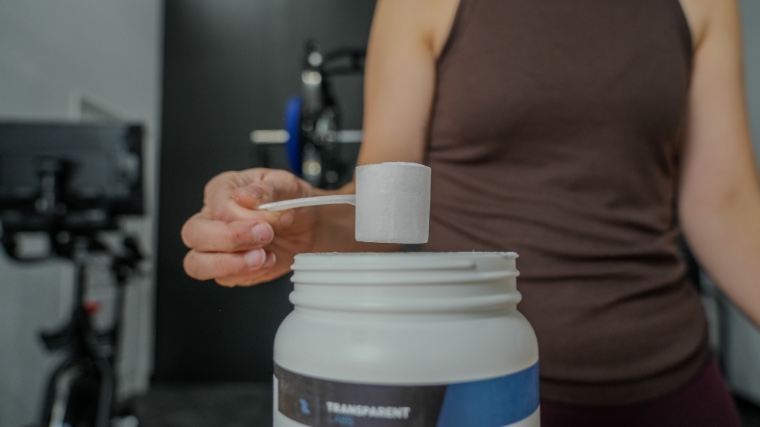
To determine how long you can expect to feel the effects, it can be helpful to know the half-life of the ingredients — especially caffeine and L-arginine. Half-life refers to how long it takes for half of the original dose of a substance to leave your system. (1) With pre-workout ingredients, you may be able to feel the height of the purported effects during their half-life.
What Is Pre-Workout?
As our expert reviewer and registered dietitian Jordan Hill explains, these commonly-used supplements can provide a jolt as you get set for your workout. “Pre-workout is a supplement taken prior to a workout or training session to enhance performance,” she says. You can find pre-workout products in liquid, capsule, and gummy form, but the uber-popular powder form needs to be mixed with liquid (typically water) to create a convenient drink.
While most generally include caffeine, amino acids, and vitamins, Hill adds that they can offer different benefits. “Some pre-workouts provide an energy boost, help reduce perceived exertion, enhance alertness, or improve blood flow.”
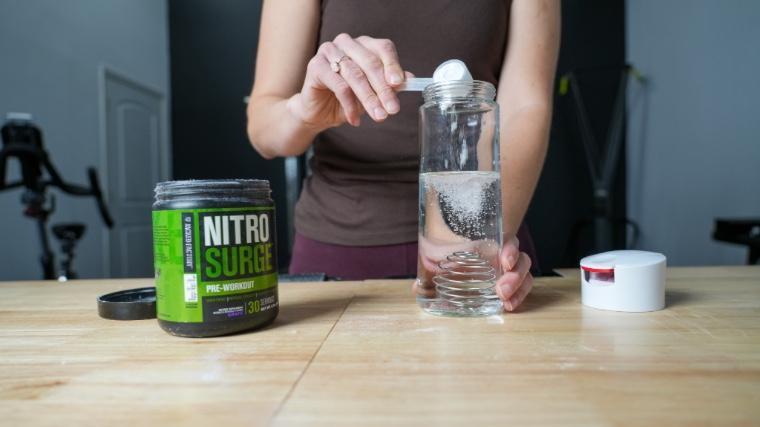
Since pre-workout can feature different ingredients, it is not a standardized product, and scientific research on its effectiveness is still being studied. However, pre-workout supplements are popular among competitive weightlifters, as well as anyone trying to break through a strength training plateau. In 2019, the global pre-workout market was valued at $12.6 billion by Grand View Research. (2)
When to Take Pre-Workout
The specific instructions for each product can differ, but our expert reviewer and registered dietitian Chelsea Rae Bourgeois offers up a general rule of thumb. “You want to try to take them around 15 to 30 minutes before your workout starts,” she says. “Find the sweet spot that works for you where you find you have the best energy to make the most of your workout.” Before mixing up your drink or popping your gummy, make sure to follow the instructions on the label to maximize that product’s effectiveness.
Common Pre-Workout Ingredients
“Common pre-workout ingredients include caffeine, beta-alanine, branched-chain amino acids, creatine, sodium bicarbonate, and nitric oxide precursors like arginine, citrulline, and nitrate,” says Jordan Hill, our expert reviewer and registered dietitian. “It’s important to note that not all pre-workouts are made equal and some may contain one or multiple of the above ingredients.”
Two of these ingredients — caffeine and l-arginine — have specific onset and half-life periods. Those time frames can give you an idea of how long a given pre-workout will last. Some pre-workouts containing caffeine and arginine can take 60 to 90 minutes to reach their highest effects. Arginine may leave your system within 120 minutes, but caffeine can last up to seven hours. (3)(4)(5)
L-Arginine
L-arginine is a non-essential amino acid that is a common addition to many of the best nitric oxide supplements. It’s also frequently used in pre-workout formulas because nitric oxide can enhance blood flow, helping deliver more oxygen and nutrients to your muscles. (4) This may also lead to better muscle contractions during exercise.
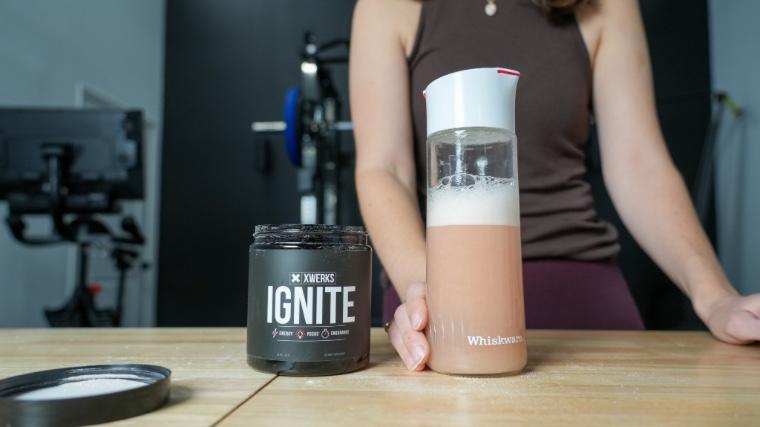
The strongest effects of arginine can take 60 to 90 minutes to kick in after ingestion. (4) The half-life of L-arginine has been shown to be anywhere from 30 minutes to two hours, but it depends on the dosage amount and the individual’s body. (5)
Beta-Alanine
Both carnosine and its precursor — beta-alanine — are amino acids that may help reduce lactic acid buildup. (6)(7) “Beta-alanine works by preventing muscle fatigue, allowing you to work out at a higher intensity for a longer period,” explains our expert reviewer and registered dietitian Justine Hays. It is widely used in these pre-workouts because its effects are backed by plenty of research.
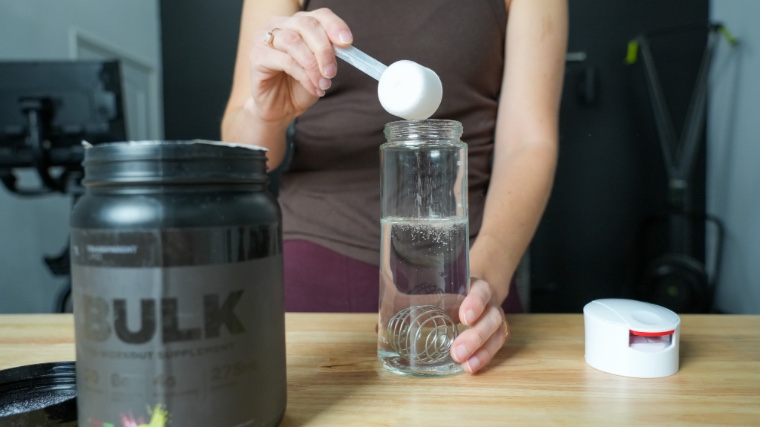
“Beta-Alanine is well-researched and generally regarded as safe when taken by most adults, as directed,” says Hays. Bourgeois adds how much you look for per serving. “Most research suggests consuming 4 to 6 grams daily,” she says.
BCAAs (Branched-Chain Amino Acids)
BCAAs stands for branched-chain amino acids. These are essential amino acids needed for muscle protein synthesis to occur along with resistance training. They can aid in recovery and building muscle mass — hence their frequent inclusion in pre-workouts. While you can boost your daily intake with the best BCAA supplements, you can naturally get BCAAs by consuming complete protein sources. (8)
Caffeine
If you’ve ever used a cup of coffee to get yourself through the workday, you’re familiar with the effects of caffeine — though there is likely much more caffeine in your pre-workout than your average morning pick-me-up. Most pre-workouts contain around 250 milligrams, which is far more than your standard cup of joe. “For a frame of reference, one cup of coffee provides around 95 milligrams of caffeine,” Bourgeois explains. (9)
It can take up to 60 minutes to feel the maximum effects of caffeine, plus it has a half-life of roughly three to seven hours in most adults. (3) So, while you may feel the height of your buzz after an hour, it hangs around in your system for much longer. Many pre-workouts pack in caffeine because it has been shown to delay fatigue and improve focus and cognition during exercise. (7)(10) Most of the best pre-workouts for weight loss also contain caffeine, as it may help — along with a balanced diet — promote fat loss and an overall reduction in body mass index (BMI). (11)
L-Citrulline
L-citrulline is a non-essential amino acid and precursor for another non-essential amino acid known to precede nitric oxide production — L-arginine. Increased nitric oxide is thought to bring a boost to athletic performance because it can widen blood vessels, allowing for increased blood flow. (12) More blood to your pumping muscles means more oxygen to support all that work.
You may also see citrulline malate on your pre-workout’s label. When L-citrulline is combined with malic acid, it may increase absorption rates and bioavailability. (13) When our expert reviewer Bourgeois checks a pre-workout’s supplement facts, she looks for the research-backed dosage. “Citrulline malate is proven to be a nitric oxide enhancer,” she says. “Most research points to a recommended 6 to 8 grams per dose.”
Creatine
Creatine is an amino acid and one of the most well-researched supplements for boosting athletic performance. It plays a role in energy production and can increase your ATP stores for better muscular contractions during high-intensity weightlifting. Creatine benefits may also include muscle protein synthesis, which can lead to muscle growth. (14)
When you inspect the label of your favorite pre-workout, Bourgeois recommends looking for the research-backed effective range. “Research shows creatine supplements are best absorbed in doses of 3 to 5 grams,” she says.
Taurine
Taurine is an essential amino acid that may function as an antioxidant in your body. It’s thought to reduce oxidative stress, which may increase your endurance during resistance exercise. (7)
Tyrosine
Tyrosine is a non-essential amino acid associated with releasing dopamine and adrenaline. It may improve your focus and performance during high-stress situations — including resistance training. Research on tyrosine supplements is mixed, but it’s been shown to potentially reduce stress when exercising in the heat and boost cognition with a lack of sleep. (15)(16)
Other Ingredients
There are other common ingredients in pre-workout, but more research is needed on the exact periods of time they may last for. Two hours seems to be the maximum amount of time you may feel the effects of arginine and caffeine together in your system — though caffeine can remain in your system for up to seven hours. (3) If you find that caffeine can make you feel a bit jittery and don’t need the added energy boost, many of the best non-stim pre-workouts leave it out altogether.
It should be noted that all substances impact individuals differently, and there is not a concrete time that pre-workout will last for everyone. It may depend on the serving size, the amount of each ingredient, your body weight, the type of exercise you’re doing, and your general sensitivity to or tolerance of the ingredients.
Different formulations of pre-workout also contain different ingredients. The most common ingredients in multi-ingredient pre-workout supplements (MIPS) are generally beta-alanine, caffeine, citrulline, tyrosine, taurine, and creatine. Many pre-workouts also contain arginine, BCAAs, and other vitamins. (9)
Benefits of Pre-Workout
After you take pre-workout, you may have up to roughly two hours to reap the benefits during your training session. According to our expert reviewer and registered dietitian Jordan Hill, “Depending on the pre-workout taken, some benefits may include increased energy and focus, a decreased perceived exertion, improved endurance, increased strength, improved blood flow, or enhanced recovery.”
When combined, the different substances in pre-workout are meant to help you put in quality reps and potentially train a little bit harder. Let’s break down the potential performance-enhancing effects of a pre-workout supplement.
May Help Increase Energy Levels
Caffeine and other stimulants may give you an increased feeling of energy to power through your workout, as studies on the effects of pre-workout are measured by self-reported subjective experiences. People taking a multi-ingredient pre-workout supplement containing caffeine reported increased feelings of energy, focus, and alertness. (7)
When you ingest caffeine, it activates your central nervous system and blocks adenosine binding. Adenosine can make you feel tired, and caffeine blocking it may decrease your feeling of tiredness. (17) A study on the effect of caffeine on resistance training showed that participants had a reduced rate of perceived exertion (RPE). (18) This sense of increased energy could potentially help you pump out a few more reps or extend your workouts.
May Help Boost Mental Focus
Self-reported effects of pre-workout supplements include a greater feeling of mental focus. (7) Stimulants in pre-workout may help boost your focus, but so can tyrosine, creatine, and nitric oxide.
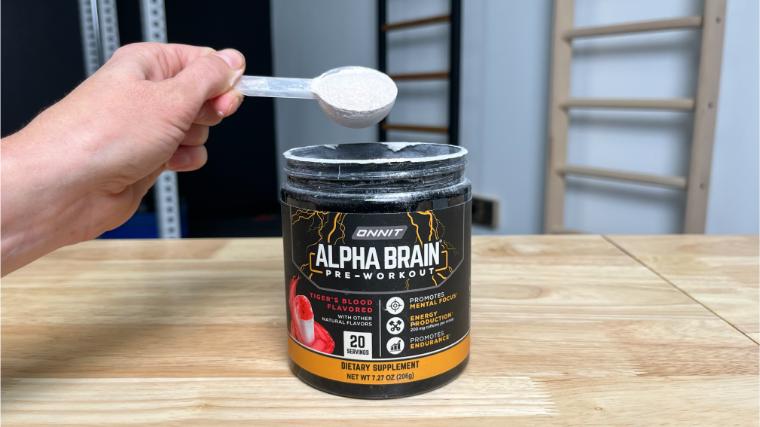
Tyrosine may decrease feelings of stress and release dopamine and adrenaline, potentially leaving you more clear-headed to focus on your form and your performance. (15)
Creatine and nitric oxide affect your brain and may have cognitive benefits. (19) Having both in your system may also boost your cognition for better focus. (12)(14)
May Help Increase Blood Flow
When you have citrulline malate and arginine in your pre-workout, you can boost your body’s supply of nitric oxide. Nitric oxide is also boosted by nitrates — some pre-workouts include beetroot juice for this reason. (20) Dietary nitrates in pre-workout have been shown to potentially improve performance in endurance and high-intensity training. (7)
Nitric oxide increases vasodilation (blood flow) by relaxing and widening your blood vessels. Increased blood flow allows more nutrients and oxygen to be delivered to your muscles while you train. It also helps relax and dilate your muscles, which studies suggest may benefit performance, hypertrophy, and training adaptations. (12)
Some studies suggest that nitric oxide can also benefit cardio workouts by lowering your blood pressure and thus boosting your performance in long-duration activities like walking, running, and cycling. (21)(22)
May Delay Muscle Fatigue
Citrulline malate, arginine, and beet powders have been shown to boost nitric oxide, which can lead to delayed muscle fatigue. (12) Caffeine can help reduce feelings of fatigue, too. (10) Beta-alanine also plays a role. Beta-alanine is known for enhancing intramuscular buffering by increasing levels of carnosine. Intramuscular buffering refers to regulating your cells during exercise as they fill up with lactic acid.
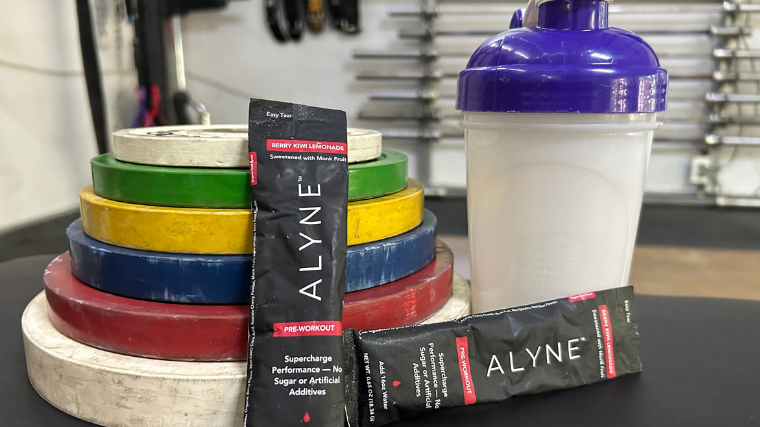
Beta-alanine and carnosine may be able to reduce lactic acid build-up in your cells, which can delay or lessen the sense of muscle soreness. (6) With less or delayed fatigue during your workouts, you may be able to increase your endurance and crank out more strength and muscle-building reps.
May Improve Athletic Performance
Let’s be real; anyone taking pre-workout supplements wants to improve their athletic performance in some way. Studies have shown that, when ingested prior to exercise, pre-workouts with caffeine may improve anaerobic power performance. (10)
Another important inclusion in many of these supplements is creatine. While creatine doesn’t create the energy jolt of caffeine, increasing your body’s creatine stores (with or without a creatine loading phase) may lead to regular performance benefits. (14)
How? To fuel your lifts (and any movement, really), your cells need ATP, or adenosine triphosphate. ATP is an energy-carrying nucleotide that fuels cellular function, leading to better muscular contractions when you lift. (23) Creatine helps ATP replenish faster once its supply naturally burns out after two to three seconds. (14) Many studies show that creatine can help you increase your strength and power output during resistance training. (24)
It may be more beneficial to take creatine post-workout. (7) But the overall amount of creatine in your diet and body is what adds up. If your pre-workout has creatine, it’s an efficient way to reach your intake goals if you are trying to build up your creatine stores.
Side Effects of Pre-Workout
As our expert reviewer and registered dietitian Jordan Hill lays out, the potential benefits of pre-workout also come with potential side effects. “If taken at recommended doses, side effects are likely minimal,” she says. “However, depending on the pre-workout taken, someone may experience jitters, a tingling sensation, increased heart rate, or digestive issues.” Here are the most common adverse effects to look out for when taking pre-workout.
May Cause a Jittery Feeling
Caffeine and other stimulants may give some people a case of the jitters. Other reported side effects include feelings of anxiety, restlessness, insomnia, fidgeting, irritability, flushed face, muscle twitching, and agitation. (25)
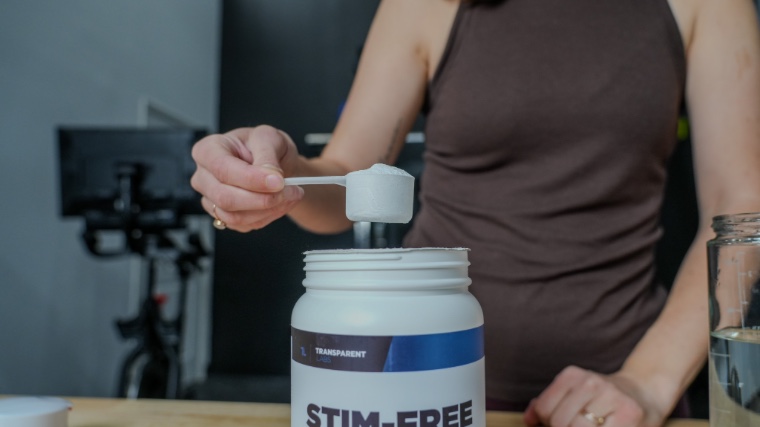
Pre-workout supplements are also known to cause your heart rate and blood pressure to elevate. In some cases, they may also cause temporary cardiac arrhythmia or an irregular heart rate. (26) These changes in your heart activity and blood pressure may lead to that jittery feeling, as well.
May Cause a Tingling Sensation
Beta-alanine may cause feelings of paraesthesia. Paraesthesia refers to a tingling, numbness, or “pins and needles” feeling on the surface of your skin. It’s been reported to occur 10 to 20 minutes after ingesting beta-alanine. Paraesthesia is not thought to be a harmful health concern, but may feel uncomfortable. (27)
May Cause Headaches
The amount of caffeine you ingest can cause headaches. (25) If you drink coffee and take a pre-workout that contains caffeine afterwards, that could be the culprit. It’s important to be mindful of your caffeine intake, avoiding over 400 milligrams per day.
And while nitric oxide improves vasodilation (which is great for your pump potential in the gym), headaches can be caused by too much blood flow. It may be because blood is flowing to your brain too quickly. Another theory is that nitric oxide may cause blood vessels in your brain to dilate too fast. This can cause a headache immediately after ingestion. (28)
May Cause Gastrointestinal Issues
Gastrointestinal (GI) issues are often associated with dietary supplements. Pre-workout supplements containing creatine and caffeine may cause bloating, nausea, stomach pain, or diarrhea in some users. (25)(29)
Not FDA-Approved
Pre-workout is a dietary supplement, and dietary supplements don’t need to be approved by the Food and Drug Administration (FDA) before marketing. Supplements don’t need to prove that they work or are safe before being sold. (30) Some may contain additives, chemicals, or banned substances.
Stim pre-workouts may contain dimethylamylamine (DMAA), which is banned by the World Anti-Doping Agency (WADA). (31) Banned substances may cause adverse health effects. Always read the ingredients before choosing a pre-workout.
It’s important to consult your healthcare professional before trying a new supplement as it may interact with your body, medications, or medical conditions.
Jolting Up
Pre-workout supplements are popular for a reason — the mix of ingredients hits your central nervous system and can help you feel more energized, alert, and focused. (10) Depending on the ingredients, dosage, and your body composition, the peak of pre-workout effects may last anywhere from 30 minutes to two hours. The performance boost these supplements can offer might be just what you need to reach your fitness goals.
Timed effectively, you can reap the performance-enhancing feelings to lift heavier and longer with good form. While pre-workout can help you bust through a plateau, it also has the potential to make you feel jittery, anxious, and tingly or may cause headaches or GI distress. Always stay alert as to how you’re feeling, and try a different supplement or pre-workout alternatives to find one that works for you.
FAQs
How long do pre-workout side effects last?
The height of pre-workout effects can last up to two hours, but it could be longer depending on the amount of caffeine and other stimulants included in the formula.
How late is too late for pre-workout?
You don’t want to take pre-workout too close to going to sleep as caffeine and stimulants can cause insomnia. (25) Since caffeine can last up to seven hours, you may not want to take a pre-workout less than six hours before bed.
Do you crash after pre-workout?
Some people experience a crash after the effects of pre-workout wear off, usually caused by the amount of caffeine or other stimulants. Choosing a non-stim pre-workout may help you avoid an energy crash.
How much pre-workout should you take?
People respond differently depending on the product, dosage, and their individual sensitivities and tolerances. It’s best to read the label and start with the lowest recommended dose (or a half dose) to see how it makes you feel before increasing.
How do you wear off pre-workout effects?
You may need to wait out the time it takes for pre-workout to leave your body for the effects to wear off. Though the height of a pre-workout spike may only last about two hours, caffeine and other stimulants may stay in your system longer. You can emphasize hydration by drinking water to try to lessen the intensity of its effects.
References
- Hallare J, Gerriets V. Half Life. [Updated 2022 Jun 23]. In: StatPearls [Internet]. Treasure Island (FL): StatPearls Publishing; 2023 Jan-.
- Grand View Research. Pre-workout Supplements Market Size, Share & Trends Report Pre-workout Supplements Market Size, Share & Trends Analysis Report By Form (Powder, Capsule, Ready To Drink).
- Temple JL, Bernard C, Lipshultz SE, Czachor JD, Westphal JA, Mestre MA. The Safety of Ingested Caffeine: A Comprehensive Review. Front Psychiatry. 2017 May 26;8:80.
- Viribay A, Burgos J, Fernández-Landa J, Seco-Calvo J, Mielgo-Ayuso J. Effects of Arginine Supplementation on Athletic Performance Based on Energy Metabolism: A Systematic Review and Meta-Analysis. Nutrients. 2020 May 2;12(5):1300.
- Bode-Böger SM, Böger RH, Galland A, Tsikas D, Frölich JC. L-arginine-induced vasodilation in healthy humans: pharmacokinetic-pharmacodynamic relationship. Br J Clin Pharmacol. 1998 Nov;46(5):489-97.
- Hoffman JR, Emerson NS, Stout JR. β-Alanine supplementation. Curr Sports Med Rep. 2012 Jul-Aug;11(4):189-95.
- Harty PS, Zabriskie HA, Erickson JL, Molling PE, Kerksick CM, Jagim AR. Multi-ingredient pre-workout supplements, safety implications, and performance outcomes: a brief review. J Int Soc Sports Nutr. 2018 Aug 8;15(1):41.
- Santos CS, Nascimento FEL. Isolated branched-chain amino acid intake and muscle protein synthesis in humans: a biochemical review. Einstein (Sao Paulo). 2019 Sep 5;17(3):eRB4898.
- Jagim AR, Harty PS, Camic CL. Common Ingredient Profiles of Multi-Ingredient Pre-Workout Supplements. Nutrients. 2019 Jan 24;11(2):254.
- Martinez N, Campbell B, Franek M, Buchanan L, Colquhoun R. The effect of acute pre-workout supplementation on power and strength performance. J Int Soc Sports Nutr. 2016 Jul 16;13:29.
- Tabrizi, R., Saneei, P., Lankarani, K. B., Akbari, M., Kolahdooz, F., Esmaillzadeh, A., Nadi-Ravandi, S., Mazoochi, M., & Asemi, Z. (2019). The effects of caffeine intake on weight loss: a systematic review and dose-response meta-analysis of randomized controlled trials. Critical reviews in food science and nutrition, 59(16), 2688–2696.
- Gonzalez AM, Townsend JR, Pinzone AG, Hoffman JR. Supplementation with Nitric Oxide Precursors for Strength Performance: A Review of the Current Literature. Nutrients. 2023 Jan 28;15(3):660.
- Gough, L. A., Sparks, S. A., McNaughton, L. R., Higgins, M. F., Newbury, J. W., Trexler, E., Faghy, M. A., & Bridge, C. A. (2021). A critical review of citrulline malate supplementation and exercise performance. European journal of applied physiology, 121(12), 3283–3295.
- Kreider RB, Kalman DS, Antonio J, Ziegenfuss TN, Wildman R, Collins R, Candow DG, Kleiner SM, Almada AL, Lopez HL. International Society of Sports Nutrition position stand: safety and efficacy of creatine supplementation in exercise, sport, and medicine. J Int Soc Sports Nutr. 2017 Jun 13;14:18.
- Tumilty L, Davison G, Beckmann M, Thatcher R. Oral tyrosine supplementation improves exercise capacity in the heat. Eur J Appl Physiol. 2011 Dec;111(12):2941-50.
- Neri DF, Wiegmann D, Stanny RR, Shappell SA, McCardie A, McKay DL. The effects of tyrosine on cognitive performance during extended wakefulness. Aviat Space Environ Med. 1995 Apr;66(4):313-9.
- Institute of Medicine (US) Committee on Military Nutrition Research. Caffeine for the Sustainment of Mental Task Performance: Formulations for Military Operations. Washington (DC): National Academies Press (US); 2001. 2, Pharmacology of Caffeine.
- Grgic, J., Mikulic, P., Schoenfeld, B.J. et al. The Influence of Caffeine Supplementation on Resistance Exercise: A Review. Sports Med 49, 17–30 (2019).
- Roschel H, Gualano B, Ostojic SM, Rawson ES. Creatine Supplementation and Brain Health. Nutrients. 2021 Feb 10;13(2):586.
- Dos Santos Baião D, Vieira Teixeira da Silva D, Margaret Flosi Paschoalin V. A Narrative Review on Dietary Strategies to Provide Nitric Oxide as a Non-Drug Cardiovascular Disease Therapy: Beetroot Formulations-A Smart Nutritional Intervention. Foods. 2021 Apr 15;10(4):859.
- Lansley KE, Winyard PG, Fulford J, Vanhatalo A, Bailey SJ, Blackwell JR, DiMenna FJ, Gilchrist M, Benjamin N, Jones AM. Dietary nitrate supplementation reduces the O2 cost of walking and running: a placebo-controlled study. J Appl Physiol (1985). 2011 Mar;110(3):591-600.
- Wylie LJ, Mohr M, Krustrup P, Jackman SR, Ermιdis G, Kelly J, Black MI, Bailey SJ, Vanhatalo A, Jones AM. Dietary nitrate supplementation improves team sport-specific intense intermittent exercise performance. Eur J Appl Physiol. 2013 Jul;113(7):1673-84.
- Dunn J, Grider MH. Physiology, Adenosine Triphosphate. [Updated 2023 Feb 13]. In: StatPearls [Internet]. Treasure Island (FL): StatPearls Publishing; 2024 Jan-. Available from: https://www.ncbi.nlm.nih.gov/books/NBK553175/
- Mills S, Candow DG, Forbes SC, Neary JP, Ormsbee MJ, Antonio J. Effects of Creatine Supplementation during Resistance Training Sessions in Physically Active Young Adults. Nutrients. 2020 Jun 24;12(6):1880.
- Evans J, Richards JR, Battisti AS. Caffeine. [Updated 2022 Nov 28]. In: StatPearls [Internet]. Treasure Island (FL): StatPearls Publishing; 2023 Jan-.
- Eudy AE, Gordon LL, Hockaday BC, Lee DA, Lee V, Luu D, Martinez CA, Ambrose PJ. Efficacy and safety of ingredients found in preworkout supplements. Am J Health Syst Pharm. 2013 Apr 1;70(7):577-88.
- Dolan E, Swinton PA, Painelli VS, Stephens Hemingway B, Mazzolani B, Infante Smaira F, Saunders B, Artioli GG, Gualano B. A Systematic Risk Assessment and Meta-Analysis on the Use of Oral β-Alanine Supplementation. Adv Nutr. 2019 May 1;10(3):452-463.
- Bagdy G, Riba P, Kecskeméti V, Chase D, Juhász G. Headache-type adverse effects of NO donors: vasodilation and beyond. Br J Pharmacol. 2010 May;160(1):20-35.
- Ostojic SM, Ahmetovic Z. Gastrointestinal distress after creatine supplementation in athletes: are side effects dose dependent? Res Sports Med. 2008;16(1):15-22.
- Ronis MJJ, Pedersen KB, Watt J. Adverse Effects of Nutraceuticals and Dietary Supplements. Annu Rev Pharmacol Toxicol. 2018 Jan 6;58:583-601.
- Lesiak AD, Adams KJ, Domin MA, Henck C, Shepard JR. DART-MS for rapid, preliminary screening of urine for DMAA. Drug Test Anal. 2014 Jul-Aug;6(7-8):788-96. doi: 10.1002/dta.1540. Epub 2013 Oct 25.